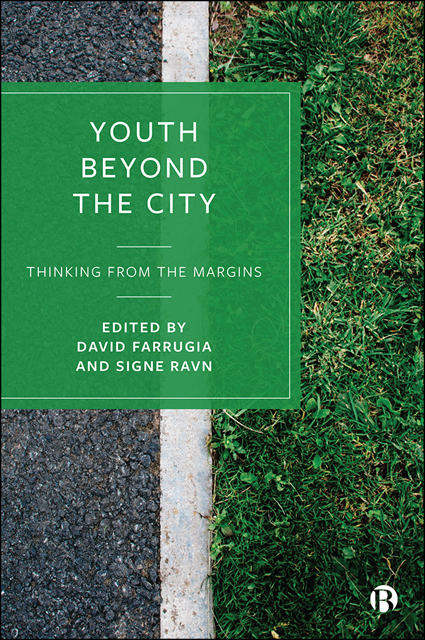Book contents
- Frontmatter
- Contents
- List of Figures and Tables
- Notes on Contributors
- Introduction: Thinking from the Margins
- Part I Inequalities: Education and Aspiration on the Margins
- Part II Materialities: Spatiality and Sensory Embodiment
- Part III Identities: Mobility, Rootedness and Belonging
- Part IV Temporalities: Historicizing Space and Place
- Index
5 - ‘A Quiet Place’: The Natural Environment as a Sphere of (Non)Belonging for Refugee-background Young People in Regional Resettlement Locations
Published online by Cambridge University Press: 13 October 2022
- Frontmatter
- Contents
- List of Figures and Tables
- Notes on Contributors
- Introduction: Thinking from the Margins
- Part I Inequalities: Education and Aspiration on the Margins
- Part II Materialities: Spatiality and Sensory Embodiment
- Part III Identities: Mobility, Rootedness and Belonging
- Part IV Temporalities: Historicizing Space and Place
- Index
Summary
Introduction
Refugee-receiving countries in the global north are increasingly settling people in rural and regional locations beyond the traditional metropolitan sites of refugee arrival and settlement. This is in part driven by policies that, in different countries, variously seek to lessen the perceived burden on metropolitan centres, fill labour shortages, and address rural population decline (Schech, 2014). These regional resettlement locations, while not necessarily the homogenous, White spaces they are imagined to be, are often new to refugee resettlement, consequently lacking – at least initially – the resources, knowledge and infrastructure to support refugee-background communities. For young people, the already challenging process of settlement and integration, exacerbated by this nascent service provision, intersects with broader challenges facing rural young people, and risks compounding barriers to pursuing hoped-for futures (Major et al, 2013; Joyce and Liamputtong, 2017). At the same time, regional resettlement locations promise a safer, quieter alternative to urban centres, with less risk of young people being exposed to danger or engaging in dangerous activities (Krivokapic-Skoko and Collins, 2016; Gilhooly and Lee, 2017).
This chapter draws on a cross-national, participatory arts-based study to explore an under-researched benefit of regional resettlement: engagement with the natural environment. Focused on the (non)belongings of refugee-background young people in regional resettlement locations in the UK and Australia, Dispersed Belongings utilized a creative, relational research approach that, in attending to affective and embodied dimensions of experience, surfaced the importance of the natural environment as a sphere of (non)belonging. In both research sites and cohorts – Syrian and Kurdish Syrian young people in North East England and Karen young people in Central Victoria, Australia – the natural environment provided young people with a connection to the past, a contemporary space of sanctuary, and a foundation for the future. While the role of the natural environment is not necessarily unique to rural and regional places, it is an aspect of experience generally obscured by the density and complexity of urban settings. By no means a panacea for the myriad challenges of resettlement, it is nonetheless an underexplored resource for refugee-background young people – in rural, regional and urban settings.
- Type
- Chapter
- Information
- Youth beyond the CityThinking from the Margins, pp. 96 - 115Publisher: Bristol University PressPrint publication year: 2022



